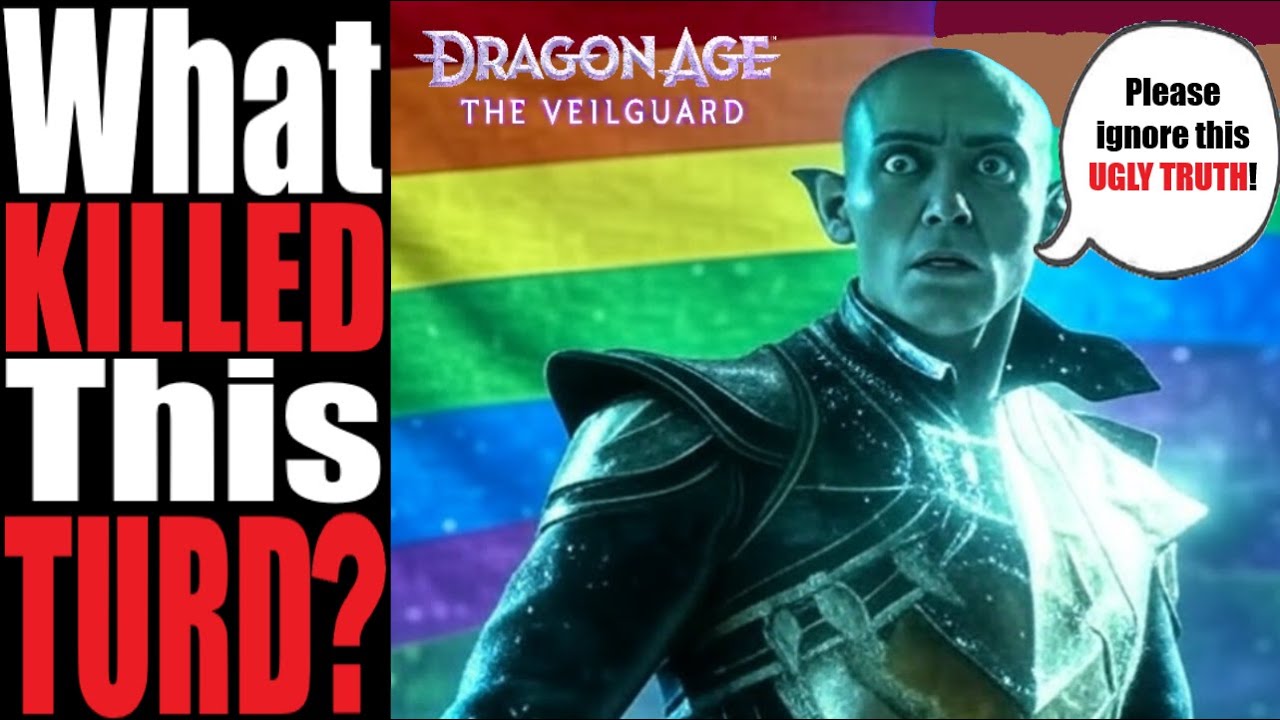Dragon Age: The Veilguard’s Failure: Bloomberg’s Postmortem and the Woke Debate
Dragon Age: The Veilguard, the long-awaited fourth installment in BioWare’s revered fantasy RPG series, has become a cautionary tale of ambition gone awry, with its October 31, 2024, release met with tepid sales and scathing criticism. A Bloomberg postmortem, published in early June 2025, attributes the game’s failure to development woes, studio layoffs, and publisher Electronic Arts’ (EA) mismanagement, while sidestepping claims that its “woke” narrative—emphasizing diverse representation and progressive themes—alienated fans. The controversy, fueled by viral X posts and YouTube videos decrying the game’s inclusivity, has sparked heated debate about whether BioWare’s creative choices or external factors doomed The Veilguard. This article explores the game’s troubled journey, the Bloomberg report’s findings, and the role of the “woke” backlash in its downfall, drawing on web-based insights for a comprehensive analysis.

The Context: A Storied Franchise Under Pressure
The Dragon Age series, launched with Dragon Age: Origins in 2009, earned acclaim for its rich worldbuilding, complex characters, and player-driven narratives set in the fantasy realm of Thedas. Dragon Age II (2011) and Dragon Age: Inquisition (2014), which won Game of the Year, solidified BioWare’s reputation, though the latter faced criticism for its open-world bloat. By 2018, when The Veilguard (initially codenamed Dreadwolf) was teased, fans were eager for a return to form after BioWare’s missteps with Mass Effect: Andromeda (2017) and Anthem (2019), both commercial and critical disappointments.
Development of The Veilguard was turbulent. Announced as a single-player RPG focused on Solas, the elven trickster from Inquisition, the project underwent multiple reboots. Early iterations included live-service elements, reflecting EA’s push for monetizable games, but fan backlash and Anthem’s failure prompted a pivot to a traditional RPG by 2021. BioWare faced significant challenges: mass layoffs in 2022 and 2023 reduced the studio’s workforce, veteran developers like Mark Darrah departed, and Canada’s unionization laws complicated hiring. The game’s scope, initially a sprawling epic, was scaled back to focus on a linear narrative with seven companions, a decision that disappointed fans expecting Inquisition’s expansive world.
The “woke” controversy emerged during the game’s marketing. Trailers showcased diverse companions, including a nonbinary elf mage, Taash, and emphasized themes of identity, equality, and resistance against oppression. Screenshots revealed dialogue options addressing pronouns and inclusivity, which some fans praised as progressive but others decried as pandering. X posts from users like @EndymionYT labeled the game “Dragon Age: The Wokeguard,” accusing BioWare of prioritizing ideology over storytelling. A June 2024 gameplay reveal, criticized for its cartoonish art style and Fortnite-like aesthetics, further alienated fans, with YouTube dislikes outnumbering likes 10-to-1. By release, The Veilguard faced a polarized fanbase, with pre-order numbers lagging behind Inquisition’s 2014 figures.
The Postmortem: Bloomberg’s Analysis
Bloomberg’s June 2025 postmortem, authored by Jason Schreier, paints a grim picture of The Veilguard’s failure. The game sold fewer than one million copies across platforms by December 2024, a fraction of Inquisition’s five million, prompting EA to cancel planned DLC and lay off 50 more BioWare staff. Schreier attributes the flop to several factors:
Development Hell: The game’s seven-year cycle included three major reboots, with the live-service model scrapped in 2021 after Anthem’s collapse. Scope creep and EA’s shifting priorities—pushing for a God of War-style cinematic experience, then a smaller, mission-based structure—delayed progress. By 2023, BioWare was rushing to meet EA’s fiscal deadlines, leading to cut content like additional companion quests.
Studio Turmoil: Layoffs, including 250 staff in 2022 and 50 in 2023, gutted BioWare’s expertise. Key departures, such as writer David Gaider and producer Mark Darrah, left the team reliant on less experienced staff. Canada’s union laws, while protective, slowed hiring, forcing BioWare to outsource to EA’s Romanian studio, which introduced bugs and cultural disconnects.
EA’s Mismanagement: EA’s insistence on Frostbite, an engine ill-suited for RPGs, caused technical issues, echoing Andromeda’s problems. Marketing missteps, like the June 2024 trailer’s pop-heavy tone, failed to resonate with Dragon Age’s mature fanbase. EA’s decision to rush the release, despite internal pleas for polish, resulted in a 75/100 Metacritic score, with critics citing a “generic” story and clunky combat.
Bloomberg’s report conspicuously avoids the “woke” controversy, mentioning only “online backlash” and “fan expectations.” Schreier notes that BioWare aimed to “modernize” the series for a new audience, but glosses over specific criticisms of its inclusivity focus. This omission has drawn ire on X, with users like @TheQuartering accusing Bloomberg of “pretending woke wasn’t the problem.” YouTube videos, such as one titled “Dragon Age the FAILguard: Bloomberg’s postmortem pretends WOKE was NOT the problem,” argue that BioWare’s emphasis on pronouns, nonbinary characters, and social justice themes alienated core fans, who felt the game sacrificed Dragon Age’s gritty fantasy for a sanitized, agenda-driven narrative.
The “Woke” Debate: Cause or Scapegoat?
The claim that The Veilguard’s “woke” elements caused its failure is contentious. Critics on X and r/KotakuInAction point to specific grievances:
Narrative Choices: Dialogue addressing pronouns and identity, such as a scene where players select Taash’s pronouns, was seen as immersion-breaking. A companion quest tackling systemic inequality in Tevinter was criticized as “preachy,” with Reddit users on r/dragonage arguing it felt “shoehorned” compared to Inquisition’s nuanced slavery themes.
Character Design: Taash’s nonbinary identity and other companions’ diverse backgrounds—such as a Qunari warrior with a disability—were praised by outlets like Polygon but mocked on X as “checkbox diversity.” Fans contrasted this with Origins’ morally complex characters, like Loghain, who lacked explicit social commentary.
Art Style: The shift to a vibrant, Fortnite-esque aesthetic, with exaggerated companion designs, clashed with Dragon Age’s dark fantasy roots. A leaked 2023 alpha build, showing a grittier look, intensified claims that BioWare “woked up” the visuals post-reboot.
Fan Alienation: Steam reviews, averaging “mixed” with 65% positive, cite “pandering” as a key issue, with one user writing, “I wanted Dragon Age, not a lecture.” A boycott campaign on r/GamingLeaksAndRumours, urging fans to skip pre-orders, gained traction, with some linking low sales to this backlash.
Supporters, including fans on r/DragonAge, argue the “woke” label is a scapegoat. They note that Inquisition featured diverse romances, like Dorian’s gay storyline, without similar outrage, suggesting the backlash reflects broader cultural polarization. IGN’s 8/10 review praised The Veilguard’s inclusivity as “authentic,” arguing its themes of resistance mirror Thedas’ lore. BioWare’s intent, per a 2024 Game Informer interview with director Corinne Busche, was to reflect “the world we live in,” with Taash’s arc inspired by real nonbinary experiences. Fans on X, like @RPGFanatic, contend that poor marketing, rushed development, and EA’s track record—not inclusivity—drove the failure.
Data complicates the narrative. Steam’s peak concurrent players for The Veilguard reached only 52,000, compared to Baldur’s Gate 3’s 875,000, despite similar RPG appeal. Yet, Star Wars Jedi: Survivor (2023), another EA title with minimal “woke” elements, also underperformed at 67,000, suggesting broader market fatigue for non-standout RPGs. The Veilguard’s $60 price and lack of a deep discount during Steam’s Autumn Sale, unlike Cyberpunk 2077’s $30 offer, may have deterred buyers, as noted on r/Steam.
Public and Industry Reactions
The public response is sharply divided. On X, critics like @Synthetic_Man and @Grummz amplify the “woke” narrative, with videos garnering millions of views claiming BioWare “betrayed” fans. Steam reviews echo this, with 40% of negative comments citing “forced diversity” or “SJW nonsense.” A YouTube video by @TheQuartering, viewed 800,000 times, argues Bloomberg’s omission of the woke backlash is “journalistic malpractice,” accusing Schreier of shielding BioWare’s missteps. Conversely, fans on r/DragonAge and X users like @LoreFriendly defend the game, citing its 80% completion rate among players as evidence of quality, per Steam achievements. They argue the hate is a “vocal minority,” with Polygon’s reader poll showing 60% approval for Taash’s inclusion.
Industry reactions are cautious. EA’s Q3 2025 earnings call, reported by GamesIndustry.biz, acknowledged The Veilguard’s “disappointing” sales but reaffirmed BioWare’s role in future projects, likely Mass Effect 5. Schreier’s Bloomberg piece, while detailed, drew flak for avoiding the inclusivity debate, with Forbes’ Paul Tassi noting that “ignoring the elephant in the room undermines the analysis.” BioWare’s silence, with no public comment since a December 2024 X post thanking fans, suggests a retreat to regroup, though Busche’s 2024 GDC talk defended the game’s vision as “true to Dragon Age.”
The “woke” backlash has broader implications. Stellar Blade’s 2025 Steam success, with 183,000 concurrent players and minimal inclusivity focus, contrasts with The Veilguard’s flop, fueling arguments that fans reject progressive narratives. Yet, Baldur’s Gate 3’s 2023 triumph, with diverse characters and pronoun options, suggests execution matters more than ideology. Kotaku’s Matt Kamen argued that The Veilguard’s failure lies in “half-baked” storytelling, not diversity, a view echoed by r/DragonAge moderates.
The Bigger Picture: Gaming, Culture, and Creative Risk
The Veilguard’s failure reflects gaming’s evolving landscape. The “woke” debate, amplified by X and YouTube, mirrors controversies around The Last of Us Part II (2020) and Hogwarts Legacy (2023), where cultural flashpoints overshadowed gameplay. BioWare’s intent to modernize Dragon Age for a diverse audience, as Busche articulated, aligns with industry trends—Spider-Man: Miles Morales and Horizon Forbidden West embraced inclusivity successfully—but poor execution and fan mistrust undermined the effort. X posts like @EndymionYT’s, claiming BioWare “catered to Twitter, not fans,” highlight a perceived disconnect, though Twitter’s influence waned by 2025.
Development challenges are equally critical. BioWare’s reliance on Frostbite, layoffs, and EA’s rushed timeline, as Bloomberg details, echo Anthem’s collapse, suggesting systemic issues at EA. The studio’s pivot from live-service to single-player, while fan-driven, left The Veilguard caught between visions, with cut content like a planned dwarven city frustrating players, per r/DragonAge leaks. These missteps, not just inclusivity, likely drove the game’s 75/100 Metacritic score and low sales.
Mental health and fan toxicity are also at play. BioWare developers faced death threats over Taash’s inclusion, as reported by PC Gamer, echoing The Last of Us Part II’s harassment. The “woke” backlash, while vocal, may be overstated—Steam’s 65% positive reviews suggest a divided, not universally hostile, fanbase—but its amplification on X creates a chilling effect for studios. BioWare’s challenge, as IGN’s Destin Legarie noted, is balancing creative risk with fan expectations in a polarized climate.
What’s Next for BioWare and Dragon Age?
For BioWare, The Veilguard’s failure is a pivotal moment. The studio’s next project, Mass Effect 5, slated for 2028, must rebuild trust. Early concept art, shared at N7 Day 2024, promises a return to sci-fi roots, but BioWare’s reduced staff—down to 250 from 400 in 2018—may limit ambition. EA’s continued support, per GamesIndustry.biz, hinges on cost-cutting, with outsourcing likely to persist. A Dragon Age revival seems distant, with no sequel planned, though a 2026 remaster of Origins could test fan appetite, as speculated on r/DragonAge.
For fans, The Veilguard’s legacy is bittersweet. Mods on Nexus Mods, tweaking combat and visuals, keep the game alive for enthusiasts, but its “mixed” Steam rating and 52,000 peak players signal a lost opportunity. The “woke” debate, while divisive, may fade as players revisit the game via discounts, with PC Gamer noting its $30 Black Friday 2024 price boosted sales slightly.
EA faces broader scrutiny. The publisher’s focus on live-service flops like Suicide Squad: Kill the Justice League (2024) and Anthem has strained its single-player portfolio, with Jedi: Survivor also underperforming. A shift to smaller, polished RPGs, as Forbes suggests, could salvage EA’s reputation, but The Veilguard’s rushed release highlights the need for better oversight.
Conclusion
Dragon Age: The Veilguard’s failure, as dissected in Bloomberg’s postmortem, is a complex tale of development chaos, studio struggles, and cultural backlash. While the report sidesteps the “woke” controversy, the game’s inclusivity focus—praised by some, vilified by others—played a role in its polarized reception, alongside EA’s mismanagement and BioWare’s execution missteps. With fewer than one million copies sold and a legacy as “The Failguard,” the game underscores the risks of alienating core fans while chasing new audiences. As BioWare looks to Mass Effect 5 and EA grapples with its RPG strategy, The Veilguard stands as a warning: in Thedas, as in gaming, ambition without execution spells doom. The saga of Dragon Age continues, but its future hangs by a thread.





